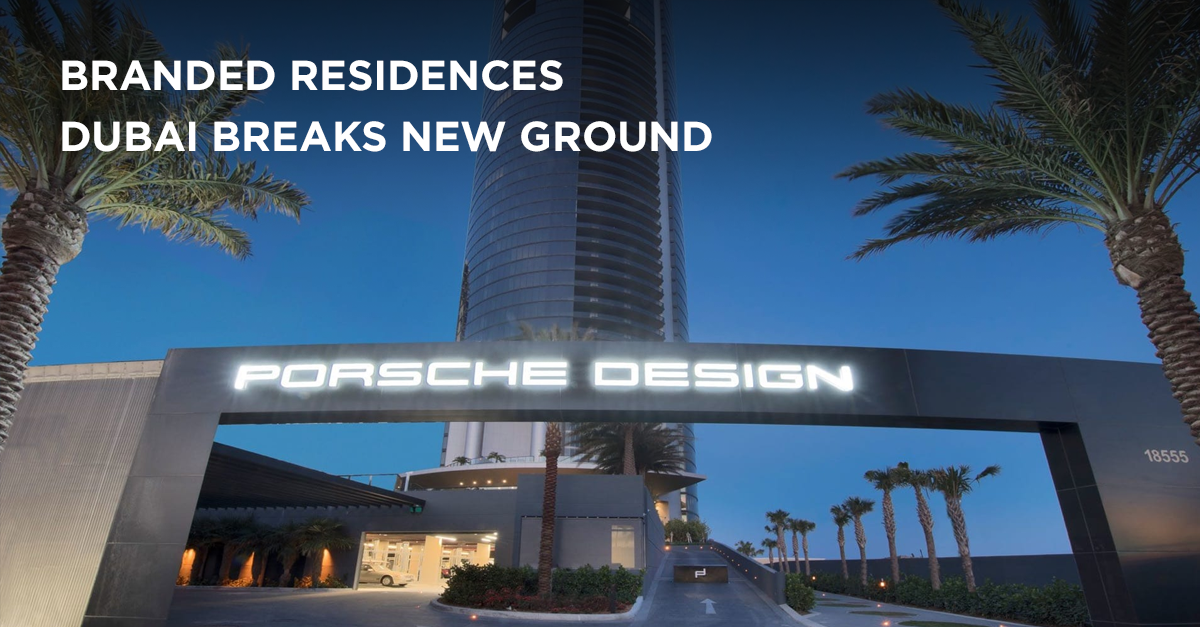Branded residences: Dubai breaks new ground
The term ‘branded residences’ has expanded in scope, definition and traction in recent years. In the traditional sense, however, branded residences are residential developments led by hotels, either integrated with the hotel itself or developed under the hospitality brand, with amenities and experiences akin to a hotel. Knight Frank attributes the first-of-its-kind branded residence to the Sherry-Netherland hotel in Manhattan, launched in 1927(1). New York has been the undisputed capital of branded residences from the get-go, although the sector has transcended beyond geographical frontiers to over 64 countries ever since. With its customary enthusiasm for redefining a concept and taking it to new heights, Dubai is set to change the status quo in branded residences soon.
If a recent Savills research report is anything to go by, Dubai is being touted as the next global capital of branded residences by the end of 2019, unseating New York in the process(2). According to the reliable real estate consultancy firm, Dubai’s rise to the pinnacle of branded residential development is “thanks to a pipeline equal to its current supply of just over 20 schemes”. Dubai has four times the projects in the pipeline, compared to New York, while both cities are comparable in completed projects. The supply surge in Dubai coincides well with the Expo 2020 event, but the number of projects is only part of the story.
Branded residences
Until the year 2000, the branded residence sector only boasted a handful of projects, with hospitality giants like Marriott and Four Seasons at its forefront. Today, the sector is diversified with multinational developers and boasts over 430 projects from the Caribbean to Cambodia. Although a predominantly urban concept, branded residences are emerging at seafront and fringe locations as well, especially in Asia-Pacific. As things stand, the branded residence market remains most matured in North America, owing to having its origins in that market, but it continues to make considerable headway in other parts of the world as well. Besides Europe—which accounts for a mere 7% of projects—the concept is gaining traction in important markets, particularly in Asia and the Middle East.
Dubai’s rise as the global capital of branded residences signifies decentralization and a visible market shift. Branded residences are a synergy between real estate and hospitality industries, merging the best of both worlds. As the residential market becomes increasingly future-proof and smart, branded residences are an interesting addition to the mix, where the perks of a five-star hotel meet the comforts of a home. The growing traction of branded residences underscores value-over-volume sentiment in the premium real estate segment. From the marketing standpoint, the strong brand equity of hospitality giants like Marriott, Four Seasons and Accor Hotels is working in favour of branded residences.
Dubai
Like every major global city, the branded residence sector in Dubai has its own distinct characteristics. Thanks to its pre-eminence in five-star hotels and appetite for luxury real estate development, Dubai’s rise as the global capital of branded residences is understandable. Dubai is transitioning from a sought-after tourist destination to one that is also favoured by professionals for longer term residency, in pursuit of career advancement. This evolution in customer profile has led to a consequent surge in demand for residential properties. Relaxed visa and ownership regulations, combined with epoch-making event like Expo 2020, further sweeten the pot. According to forecasts, Dubai is expected to add 24,000 high income households ($250k+) in the next five years, while over 13,500 branded residence units will be added to the market (3).
Emaar Properties, Marriott and Accor Hotels are at the forefront of this market segment, in Dubai. As a leader in innovative and sustainable real estate development, Dubai boasts a super-prime branded residence in The Royal Atlantis Resort and Residences, located in the city’s most coveted area; Palm Jumeirah. The project is an embodiment of Dubai’s far-sighted development goals and best-in-class real estate offerings. Emaar Properties has many more marquee projects in the pipeline, and despite being in the branded residence market for just five years, the Dubai-based developer is ranked sixth in Savills report.
The future
Giant hospitality players aside, luxury brands like Armani and Versace, along with smaller hospitality firms, are also entering the fray. The market is inclined towards new technologies and offerings, suited and curated for various demographic subsets. As opposed to merely enhancing amenities and ancillary facilities, the next wave of branded residences will prioritize experiences and implementation of eco-friendly and sustainable practices. Riding on the back of a 195% market growth in the last decade, over 60 projects are expected to kick off by 2019 and at least 70 projects are due to be delivered in 2020 across important global markets. The MENA region alone accounts for 21% of projects in the pipeline, which are expected to hit the market soon — just in time for Expo 2020.
The Dubai branded residences market is tailor-made for brand-conscious real estate aficionados. As an alluring, geographically well-positioned global city between the East and the West, Dubai will continue to attract the elite segment of global real estate buyers. Moving forward, branded residences will be an integral part of Dubai’s wide-ranging, diversified real estate spectrum. The ability to oscillate freely between affordable housing and branded residences, and dominate both the markets, will remain one of Dubai’s greatest real estate virtues.




